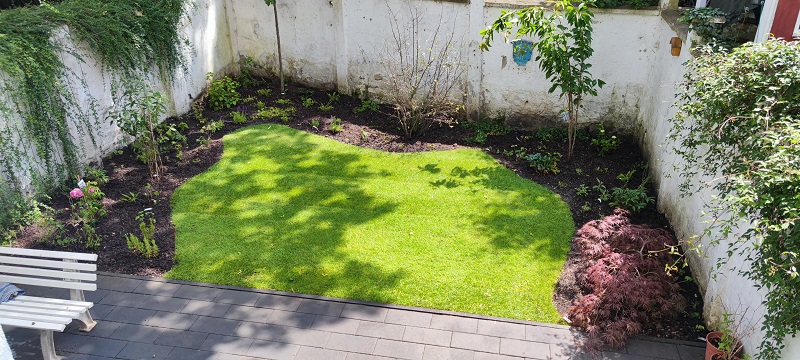Everybody loves a good transformation story, but is there anything more satisfying than cultivating that transformation with your own two hands?
One Redditor took to r/gardening to share before-and-after photos of their outdoor space. While the first photo is fairly empty except for a few potted plants, the second shows a garden replete with a rich variety of plants and a quaint lawn in the center.

"1st was taken after we already got rid of about waist-high weeds," the poster explained. "The second is now the finished look. I'm really happy with how it turned out."
Turning backyard spaces into gardens — especially when being conscious of the plants we select — can be a fulfilling and accessible way to make a sustained and positive impact on the environment.
Beyond creating a beautiful space, cultivating native plants creates food and shelter for local wildlife and a healthier ecosystem for pollinators all year round. This ultimately benefits humans, as pollinators protect our food supply.
In addition to gardens such as this Redditor's, other eco-friendly, low-maintenance lawn replacement options include buffalo grass, which is native to North America, and xeriscaping.
Other Redditors took to the comments section to sing the garden's praises.
"That's a nice example of working with whatever space you have available to make something you're personally happy with," commented one person. "Big improvement!"
"Peace is the first word that came to my mind," said another. "Gorgeous now, but just wait until next year!"
Other Redditors discussed the lawn in the center of the garden — and the potential to replace it with more native plants.
"I think some patches of lawn are absolutely fine to have, especially since there aren't that many solid alternatives that can withstand heavier foot traffic, and this space looks like it will definitely have to withstand some of that," posited one person. "It's a great start to even have half of your space be a flower bed. When these shrubs grow, they will be an excellent space for all kinds of little critters to find cover."
Join our free newsletter for easy tips to save more, waste less, and help yourself while helping the planet.









